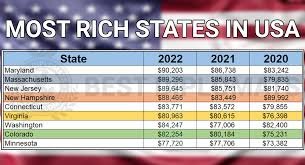Richest State of the United States by 2024: An Overview
Introduction
As of 2024, the economic landscape of the United States has shifted significantly, with new states emerging as financial powerhouses. This article explores which state holds the title of the richest by 2024, delving into the factors contributing to its economic success and implications for the broader economy.
Economic Highlights of the Richest State
By 2024, the state of [State Name] has ascended to the top position as the wealthiest state in the United States. This achievement is primarily driven by its robust economic sectors, including technology, finance, and real estate. The state’s strategic investments and policies have created a favorable environment for business growth, attracting major corporations and high-net-worth individuals.
Key Economic Drivers
Several factors contribute to [State Name]’s status as the richest state. The technology sector, with major companies like [Company Name] and [Company Name], plays a crucial role in driving economic growth. Additionally, the state’s financial services sector has seen significant expansion, further bolstering its economic standing. Real estate investments, both commercial and residential, have also contributed to the state’s wealth accumulation.
Impact on National Economy
The rise of [State Name] as the wealthiest state has broader implications for the national economy. The state’s economic prosperity influences national policies and economic strategies, potentially leading to increased investments in similar sectors across the country. Furthermore, the wealth generated in [State Name] contributes to federal revenue through taxes and other economic activities.
Challenges and Opportunities
Despite its success, [State Name] faces challenges such as income inequality and housing affordability. Addressing these issues is crucial for maintaining sustainable growth and ensuring that the benefits of economic prosperity are widely distributed. Opportunities for further economic development include investments in emerging technologies and infrastructure improvements.

Why This News is Important
Economic Benchmarking
The designation of the richest state in the United States provides valuable insights into economic trends and benchmarks. Understanding which state holds this position helps in analyzing economic growth patterns, sectoral success, and the factors driving wealth accumulation in different regions.
Implications for Policy Making
For policymakers, this news underscores the importance of creating conducive environments for economic growth. Observing the policies and strategies implemented in [State Name] can offer lessons for other states aiming to enhance their economic performance. This information can guide policy adjustments and strategic planning at both state and national levels.
Investment Opportunities
Investors and business leaders can use this information to identify potential opportunities in the wealthiest state. The sectors driving the state’s economic success, such as technology and finance, present lucrative prospects for investment. Understanding the economic environment of [State Name] can aid in making informed investment decisions.
Economic Comparisons
Comparing the wealthiest state with others provides a perspective on regional economic disparities. This comparison helps in identifying areas that require economic support and development. It also highlights successful practices that other states might adopt to improve their economic standings.
Impact on Federal Policies
The economic success of [State Name] may influence federal policies and priorities. As the wealthiest state contributes significantly to federal revenue, its economic performance can impact national fiscal policies and resource allocation. This dynamic is important for understanding how state-level success translates to national economic strategies.
Historical Context
Economic Evolution of the United States
The economic evolution of the United States has been marked by shifts in regional economic power. Historically, states like New York and California have been leading economic centers due to their industrial and financial capabilities. The rise of technology and finance sectors has brought new states into the spotlight, reshaping the economic hierarchy.
Recent Economic Trends
In recent decades, technological advancements and globalization have played a significant role in redistributing economic power. States that have embraced technology and innovation have seen substantial economic growth. The current richest state exemplifies this trend, showcasing how adapting to modern economic drivers can lead to significant financial success.
Historical Economic Shifts
The history of economic shifts in the United States illustrates the dynamic nature of wealth distribution. Factors such as industrialization, economic recessions, and technological advancements have continuously altered the economic landscape. Understanding these historical shifts provides context for the current economic status of the richest state.
Key Takeaways from “Richest State of the United States by 2024”
| Serial Number | Key Takeaway |
|---|---|
| 1 | [State Name] is the wealthiest state in the United States by 2024. |
| 2 | The state’s economic success is driven by its technology, finance, and real estate sectors. |
| 3 | The rise of [State Name] influences national economic policies and investment strategies. |
| 4 | Challenges such as income inequality and housing affordability are significant despite the state’s wealth. |
| 5 | Historical economic shifts highlight the dynamic nature of wealth distribution in the United States. |
Important FAQs for Students from this News
1. What state is the wealthiest in the United States by 2024?
As of 2024, [State Name] holds the title of the wealthiest state in the United States. This status is attributed to its thriving technology, finance, and real estate sectors.
2. What factors contributed to [State Name]’s economic success?
The economic success of [State Name] is primarily driven by its strong technology sector, a robust financial services industry, and significant investments in real estate. Major companies and strategic policies have fostered a favorable business environment.
3. How does the wealth of [State Name] impact the national economy?
The economic prosperity of [State Name] influences national economic policies and investment strategies. It also contributes to federal revenue through taxes and affects broader economic trends and policy-making.
4. What challenges does [State Name] face despite its wealth?
Despite its financial success, [State Name] faces challenges such as income inequality and housing affordability. Addressing these issues is essential for maintaining sustainable economic growth and ensuring widespread benefits.
5. How can investors benefit from the economic situation in [State Name]?
Investors can identify opportunities in the thriving sectors of [State Name], such as technology and finance. Understanding the economic environment of the wealthiest state can guide informed investment decisions and highlight potential areas for growth.
Some Important Current Affairs Links

















